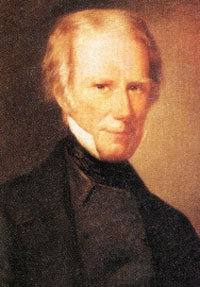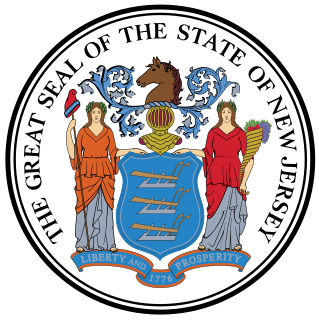On November 3, 1817, John C. Calhoun (DR) of South Carolina's 6th district resigned upon being appointed Secretary of War. [1] A special election was held for his replacement
On November 3, 1817, John C. Calhoun (DR) of South Carolina's 6th district resigned upon being appointed Secretary of War. [1] A special election was held for his replacement
| Candidate | Party | Votes [2] | Percent |
|---|---|---|---|
| Eldred Simkins | Democratic-Republican | 1,563 | 40.8% |
| William Butler | Democratic-Republican | 1,165 | 30.4% |
| Joseph Black | Democratic-Republican | 1,102 | 28.8% |
Simkins took office on February 9, 1818 [3]

The Fifteenth United States Congress was a meeting of the legislative branch of the United States federal government, consisting of the United States Senate and the United States House of Representatives. It met in the Old Brick Capitol in Washington, D.C. from March 4, 1817, to March 4, 1819, during the first two years of James Monroe's presidency. The apportionment of seats in the House of Representatives was based on the Third Census of the United States in 1810. Both chambers had a Democratic-Republican majority.

Elections to the United States House of Representatives for the 18th Congress were held at different dates in each state between July 1, 1822 and August 14, 1823 during James Monroe's second term in office. This was the first election based on the results of the 1820 Census, which added a total of 26 seats to the House. Four states lost one seat each, while nine states gained anywhere between one and eight seats.

Elections to the United States House of Representatives for the 17th Congress took place in the various states between July 3, 1820 (Louisiana) and August 10, 1821 (Tennessee). In four states the election coincided with the taking of the 4th Census. Future enumerations would henceforth be held at a different time of year.

Elections to the United States House of Representatives for the 16th Congress were held in the various states between April 28, 1818 and August 12, 1819, with Alabama electing its first representatives September 20–21, 1819 during James Monroe's first term. The Congress assembled December 6, 1819.

Elections to the United States House of Representatives for the 15th Congress were held in the various states between April 1816 and August 14, 1817. The Congress first met on December 1, 1817.

Elections to the United States House of Representatives for the 14th Congress were held at various dates in each state between April 1814 and August 10, 1815 during James Madison's second term. The Congress's first session began on December 4, 1815.

Elections to the United States House of Representatives for the 12th Congress were held in the various states between April 1810 and August 1811 during James Madison's first term in office. Louisiana elected its first representative in September 1812. Congress assembled on November 4, 1811. The first session witnessed the unprecedented occurrence of a new member, Henry Clay, being elected Speaker of the House. This has happened only once since, in 1860 when William Pennington was elected to the post.

Elections to the United States House of Representatives for the 11th Congress were held in the various states between April 1808 and May 1809. The Congress first met on May 22, 1809.
The United States Senate elections of 1818 and 1819 were elections for the United States Senate that had the Democratic-Republican Party gain two seats. The Federalists had only three seats being contested, of which they lost two and the third was left vacant due to a failure to elect.
In 1818, Uriel Holmes (F) of Connecticut's at-large district resigned from the House. A special election was held to fill the resulting vacancy.

During the 15th Congress, there were two special elections in the 6th district of Pennsylvania, both held in the year 1818. The 6th district at that time was a plural district with two seats, both of which became vacant at different times in 1818. The first vacancy was caused by John Ross (DR) resigning on February 24, 1818 and the second was caused by Samuel D. Ingham (DR) resigning July 6.

On April 20, 1818, Jacob Spangler (DR) resigned from Congress, where he'd represented Pennsylvania's 4th district. A special election was held that year to fill the resulting vacancy.
On January 1, 1818, a special election was held in North Carolina's 7th district to fill a vacancy left by the death of Representative-elect Alexander McMillan (F) before the 15th Congress had assembled.
On November 7, 1818, a special election was held in North Carolina's 11th district to fill a vacancy caused by Daniel M. Forney (DR)'s resignation earlier that year.
On February 21, 1818, Representative Peterson Goodwyn (DR) of Virginia's 19th district died in office. A special election was held to fill the resulting vacancy.

On April 20, 1818, Thomas B. Robertson (DR) of Louisiana's at-large district resigned. A special election was held to fill the resulting vacancy.

Mississippi was admitted as a state on December 10, 1817 from the western half of the former Mississippi Territory. It elected its first representative to Congress August 4–5, 1817.

Illinois elected its new member sometime in 1818, after gaining statehood.

A special election was held in Massachusetts's 20th congressional district on March 16, 1818 to fill a vacancy left by the resignation of Albion K. Parris (DR) on February 3, 1818 after being named a judge of the United States District Court for the District of Maine.

John Condit (Democratic-Republican) of New Jersey's at-large congressional district resigned to become assistant collector of the Port of New York.